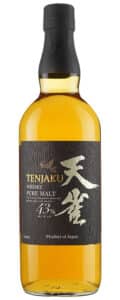
Tenjaku is a Japanese whisky. The very first thing I observed is that the web site claims it’s expertly distilled and aged in Japan. Good to listen to as decrease finish of the Japanese whisky manufacturing largely relied on imported Scotch whisky, re-packaged as a Japanese product. Regardless of their claims on the web site, the label itself says ‘product of Japan’ as a substitute of ‘made in Japan’ which isn’t a very good signal.
Their background story and data can also be a bit skinny. We all know that Tenjaku is created within the metropolis of Fuefuki (Yamanashi prefecture). The distillery isn’t disclosed, however this metropolis housed the Monde Shuzo distillery, chargeable for the horrible Fujikai spirit.
Their grasp distiller is known as Kenji Watanabe. He has 30 years of expertise, they are saying, however his title solely seems on their very own product web sites. Actually there are a number of different manufacturers, all very related. Mikuni whisky or Sanka whisky as an example, created by the identical particular person. All in all little or no indication of authenticity, to be sincere, so we’re cautious about this product.
The baseline expression is the Tenjaku blended whisky (40% ABV), however there’s additionally a Tenjaku Pure Malt at 43%. It’s aged in closely seasoned Kentucky bourbon barrels. There’s no age assertion however the US web site claims it’s composed of 5-6 yr previous malts.
Tenjaku Pure Malt (43%, OB +/- 2025)
Nostril: mild, with pear sweetness, inexperienced apple, citrus (peels) and drops of floral honey. Additionally contemporary oak shavings and really mild hints of white pepper. Refined whiffs of vanilla and grainy notes (hob nobs) beneath. Total fairly restricted.
Mouth: on the candy facet once more, with stewed apple and hints of toffee. A toasted edge, which results in extra caramelized notes, almond, inexperienced oak and a lightweight trace of cardboard, sadly. Then some cake and a wee malty and natural bitterness.
End: somewhat quick, in the direction of mild ale, peppery oak and a touch of fruit tea.
Not a foul product per se, however not precisely a product to revive our religion in (low-end) Japanese whisky both. Extra of a highball whisky, in my view. In that sense it comes near a middle-of-the-road Glen Grant 10 Years as an example. Given the obscure provenance and the modest qualities, onerous to advocate.


